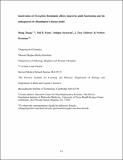Inactivation of Drosophila Huntingtin affects long-term adult functioning and the pathogenesis of a Huntington’s disease model
Author(s)
Littleton, J. Troy; Zhang, Sheng; Saraswati, Sudipta; Feany, Mel B.; Perrimon, Norbert
Downloadmain article (387.0Kb)
OPEN_ACCESS_POLICY
Open Access Policy
Creative Commons Attribution-Noncommercial-Share Alike
Terms of use
Metadata
Show full item recordAbstract
A polyglutamine expansion in the huntingtin (HTT) gene causes neurodegeneration in Huntington’s disease (HD), but the in vivo function of the native protein (Htt) is largely unknown. Numerous biochemical and in vitro studies have suggested a role for Htt in neuronal development, synaptic function and axonal trafficking. To test these models, we generated a null mutant in the putative Drosophila HTT homolog (htt, hereafter referred to asdhtt) and, surprisingly, found that dhtt mutant animals are viable with no obvious developmental defects. Instead, dhtt is required for maintaining the mobility and long-term survival of adult animals, and for modulating axonal terminal complexity in the adult brain. Furthermore, removing endogenous dhtt significantly accelerates the neurodegenerative phenotype associated with a Drosophila model of polyglutamine Htt toxicity (HD-Q93), providing in vivo evidence that disrupting the normal function of Htt might contribute to HD pathogenesis.
Date issued
2009-05Department
Massachusetts Institute of Technology. Department of BiologyJournal
Disease Models and Mechanisms
Publisher
Company of Biologists
Citation
Zhang, Sheng et al. “Inactivation of Drosophila Huntingtin affects long-term adult functioning and the pathogenesis of a Huntington’s disease model.” Disease Models & Mechanisms 2.5-6 (2009): 247-266.
Version: Author's final manuscript
ISSN
1754-8403
1754-8411